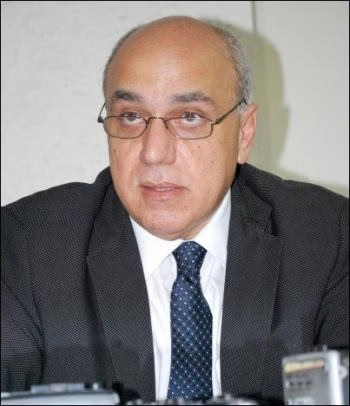MIAMI — U.S. Immigration and Customs Enforcement (ICE) has confirmed the detention of Haitian businessman Pierre Réginald Boulos following an official statement from the U.S. Department of State concerning his alleged role in destabilizing Haiti.
According to ICE, Boulos—who holds lawful permanent resident status in the United States—was taken into custody for alleged violations of U.S. immigration law and for activities believed to have contributed to political instability in Haiti.
ICE stated that Boulos was arrested on July 17, 2025, in a joint operation led by agents from Homeland Security Investigations (HSI), with support from the U.S. Department of State’s Diplomatic Security Service and the U.S. Citizenship and Immigration Services’ Fraud Detection and National Security Directorate. “Immigration and Customs Enforcement’s Homeland Security Investigations arrested Pierre Réginald Boulos, a lawful permanent resident of the U.S. and citizen of Haiti, for violating the Immigration and Nationality Act contributing to the destabilization of Haiti,” the statement read.
The arrest followed a determination by the Department of State that Boulos’ presence and actions within the United States posed a threat to U.S. foreign policy interests. “Specifically, officials determined that he engaged in a campaign of violence and gang support that contributed to Haiti’s destabilization,” ICE reported.
Authorities allege that Boulos failed to disclose key information in his application for permanent residency. ICE said he omitted details about his involvement in founding the Mouvement pour la Transformation et la Valorisation d’Haïti (MTV Ayiti), a Haitian political party.
Additionally, the Haitian government’s anti-corruption unit, the Unité de Lutte Contre la Corruption (ULCC), reportedly referred Boulos for prosecution over allegations of misusing public or private funds, further reinforcing the case for his removal under immigration law.
“Additionally, in his application to become a lawful permanent resident, he failed to disclose his involvement in the formation of a political party in Haiti, Mouvement pour la Transformation et la Valorisation d’Haiti, and that he was referred for prosecution by the Haitian government’s Unit for the Fight Against Corruption for misusing loans, supporting an additional ground of removability based on this fraud,” ICE noted.
Boulos is currently in ICE Enforcement and Removal Operations (ERO) custody, pending an immigration hearing.
His detention is part of a broader initiative by the Trump administration aimed at confronting gang violence in Haiti and disrupting its international support networks. The U.S. government recently designated Viv Ansanm, a prominent Haitian criminal group, as a Foreign Terrorist Organization (FTO).
Federal authorities allege that certain lawful permanent residents, including Boulos, have maintained ties with individuals linked to Viv Ansanm. “The Department of State has determined that certain individuals with U.S. lawful permanent resident status have supported and collaborated with Haitian gang leaders connected to Viv Ansanm, a Haitian foreign terrorist organization,” the ICE statement said.
Based on that determination, the Department of Homeland Security (DHS) is proceeding under Section 237(a)(4)(C) of the Immigration and Nationality Act, which allows the government to deport permanent residents whose activities pose a threat to U.S. foreign policy.
“The United States will not allow individuals to enjoy the benefits of legal status in our country while they are facilitating the actions of violent organizations or supporting criminal terrorist organizations abroad,” ICE added.
According to the Department of Homeland Security, this case illustrates the administration’s commitment to regional and national security.
“These new actions demonstrate the Trump administration’s firm commitment to protecting the American people, advancing our national security interests, and promoting regional security and stability,” the agency said.
Boulos’ arrest has sparked reactions in both the U.S. and Haitian political spheres. As a well-known businessman and political figure, he has long played a controversial role in Haitian public life. He previously launched a presidential bid and helped found MTV Ayiti, a party that positioned itself as a reformist alternative to traditional Haitian politics.
Over the years, Pierre Réginald Boulos has been associated in the media with both philanthropic efforts and close ties to political leaders. More recently, his name has been mentioned in connection with figures involved in the violent takeover of neighborhoods across Port-au-Prince and surrounding areas.
Although Pierre Réginald Boulos currently faces no criminal charges in the United States, he may be subject to deportation based on immigration violations and national security concerns. If an immigration judge finds him removable under the cited provisions, he could lose his U.S. residency and be returned to Haiti.
So far, no U.S. criminal indictment has been issued over his alleged gang affiliations or involvement with designated terrorist organizations. However, ICE has indicated that the combination of immigration fraud and adverse foreign policy implications is sufficient under existing law to pursue his removal.
A hearing before an immigration judge is expected on July 31 at the Krome detention Center, according to Miami Herald.
The arrest of Pierre Réginald Boulos comes amid an ongoing crisis in Haiti, where armed gangs have expanded control across the capital, disrupting basic services and displacing thousands of civilians. International agencies, including the United Nations and the Caribbean Community (CARICOM), have expressed deep concern about the deteriorating security and humanitarian situation.
In response, the U.S. government has adopted a dual-track strategy: increasing humanitarian assistance to affected communities while strengthening law enforcement efforts aimed at dismantling international gang support networks.
In March 2025, the administration implemented a new round of visa sanctions and travel bans targeting Haitian nationals suspected of financing or directing gang activity. The FTO designation for Viv Ansanm marked a significant escalation in Washington’s counter-gang strategy.
The detention of Pierre Réginald Boulos represents a key milestone in the broader immigration enforcement effort tied to foreign policy and national security. As legal proceedings unfold, ICE and the State Department have reiterated their intent to remove individuals determined to be aiding foreign criminal or terrorist entities.
Further updates are expected as the case advances through immigration court.







